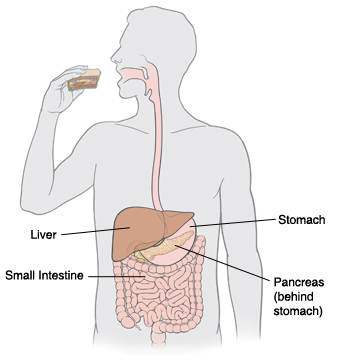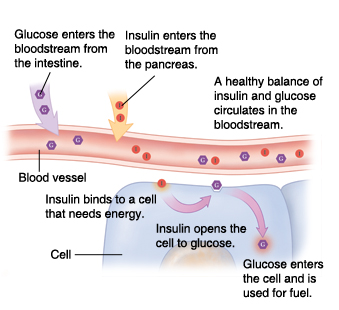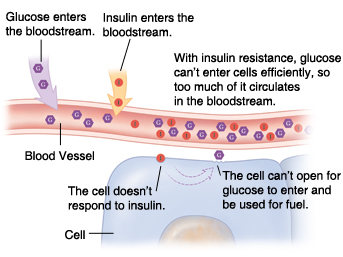Understanding Type 2 Diabetes
When your body is working normally, the food you eat is digested and used as fuel. This fuel gives energy to the body’s cells. When you have diabetes, the fuel can’t enter the cells. If not treated, diabetes can cause serious long-term health problems.

How the body gets energy
The digestive system breaks down food. This results in a sugar called glucose. Some glucose is stored in the liver. But most of it enters the bloodstream and travels to the cells. Glucose is used as fuel for energy. It needs the help of a hormone called insulin to enter the cells. Insulin is made in the pancreas. It's sent into the bloodstream. This is a response to glucose in the blood. Think of insulin as a key. When insulin reaches a cell, it attaches to the cell wall. This signals the cell to make an opening. Then glucose can enter the cell.

When you have type 2 diabetes
Early in type 2 diabetes, your cells don’t respond correctly to insulin. Because of this, less glucose than normal moves into cells. This is called insulin resistance. The pancreas then makes more insulin. But over time, the pancreas can’t make enough insulin to overcome insulin resistance. Less and less glucose enters cells. It builds up to a harmful level in the bloodstream. This is known as high blood sugar (hyperglycemia). The result is type 2 diabetes. The cells become starved for energy. This can make you feel tired and rundown.

Why high blood sugar is a problem
If high blood sugar isn't controlled, blood vessels all over the body become damaged. Ongoing high blood sugar affects organs, blood vessels, and nerves. This raises the risk of damage to the heart, kidneys, eyes, nerves, and limbs. Diabetes also makes other problems more dangerous. These include high blood pressure, high cholesterol, and triglycerides. Over time, people with uncontrolled high blood sugar have a greater risk of being disabled or dying from serious conditions. These include heart attack, heart failure, or stroke. They may also have problems in their eyes, kidneys, and nerves, mainly in their feet and lower legs. Many of these problems may be due to narrowing of blood vessels and poor circulation.
How daily issues affect your health
Many things in your daily life impact your health. This can include transportation, money problems, housing, access to food, and childcare. If you can’t get to medical appointments, you may not receive the care you need. When money is tight, it may be difficult to pay for medicines. And living far from a grocery store can make it hard to buy healthy food.
If you have concerns in any of these or other areas, talk with your healthcare team. They may know of local resources to assist you. Or they may have a staff person who can help.